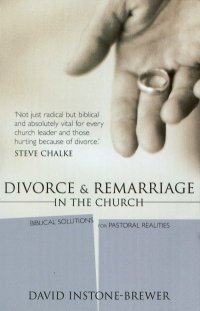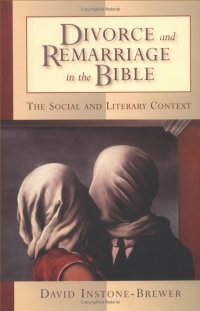

|
Reviews
Divorce and Remarriage | ||

|
"The layout of the book is remarkably clear and greatly aids the usability of the work. Each chapter begins with a short summary of the conclusions for that chapter, so that the reader is able to read the work at one time or in separate units."
Donald E. Keeney Clergy Journal, February 2003 |

|
| Full review: | ||
|
Books about marriage consist of many topics. Marriage itself is obvi-ously one topic, as are counselling and divorce. So also are communica-tion, legal and historical considerations, and biblical and theological reflections. Studies that focus on personal history are also useful. Likewise spousal abuse, divorce, and their impact on children are relevant. The works noted here dis-cuss those topics, though not exclu-sively. They offer a variety of styles. Some are more focused on individual Christians or on work in congregations. Others deal with their subjects more broadly by discussing the world in gen-eral. The topic of marriage also fits with the theme of family, which will be the subject of the November/December 2003 issue. In Divorce and Remarriage in the Bible, David Ins tone-Brewer examines biblical passages about divorce, consid-ering both the social context of the texts in history as well as their literary con-text in scripture. He is a research fellow at Tyndale House in Cambridge, Eng-land, and former minister at Llanishen Baptist Church in Cardiff, Wales. He begins his book by telling the reader his conclusions. He notes, "The con-clusions, in brief, are: Both Jesus and Paul condemned divorce without valid grounds and discouraged divorce even for valid grounds. Both Jesus and Paul affirmed the Old Testament grounds for divorce. The Old Testament allowed divorce for adultery and for neglect or abuse. Both Jesus and Paul condemned remarriage after an invalid divorce, but not after a valid divorce" (p. ix). Instone-Brewer recognizes that these are not the traditional conclusions from these texts. He bases his different conclusions on the basis of the contexts. Instone-Brewer discusses his subject in eleven chapters. He considers how Ancient Near Fast society saw marriage as a contract, how the Pentateuch allowed for remarriage, how the rights of women increased in the Intertestamental period, and how rabbinical teaching increased the grounds for divorce. He observes that Jesus rooted his teaching on divorce in biblical teaching and that for Paul, biblical grounds included neglect. He then discusses marriage vows, the history of divorce, and modern reinterpretations. His concluding chapter focuses on "Reversing Institutionalized Misun-derstandings," The layout of the book is remark-ably clear and greatly aids the usability of the work. Each chapter begins with a short summary of the conclusions for that chapter, .so that the reader is able to read the work at one time or in separate units. The book uses footnotes, which make the notes easier to find but also causes the text to flow less easily. Where they are appropriate, Hebrew and Greek type appear, but not in abundance. The book is well indexed by subject and by scripture text. The bibli-ography includes a variety of primary and secondary sources. Of these works, Family Ministry is the most comprehensive and most focused on congregations. Fighting for Your Marriage offers some of the best advice for communication. Marriage: Just a Piece of Paper and Divorce and Remar-riage in the Bible offer the best discus-sions of context, especially with their presentation of the history of marriage and divorce, respectively.
Donald E. Keeney is a librarian and associate professor of learning resources at Central Baptist Theological Seminary in Kansas City, Kansas. He also teaches biblical languages. Rachel T. Keeney is a former editor of Folio: The Newsletter of Baptist Women in Ministry
|
||
| Read more reviews... | ||
Version
-for ministers
-for academics
-for everyone
Summary
Questions/
Comments
& Replies